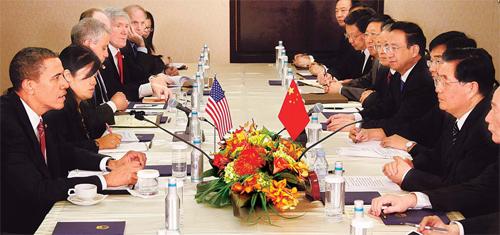TORONTO - Visiting President Hu Jintao called for a "spirit of unity" from world leaders to shake off the impact of the financial crisis, as the global economy continues to face "systemic and structural" risks with its recovery still unstable.
 President Hu Jintao and his US counterpart Barack Obama attend a meeting on the sidelines of the G20 summit in Toronto on Saturday. [Agencies]
President Hu Jintao and his US counterpart Barack Obama attend a meeting on the sidelines of the G20 summit in Toronto on Saturday. [Agencies] Hu urged the leaders to fully recognize the gravity and complexity of the impact and remodel the G20 from an emergency mechanism to a major global economic platform for emerging economies to have their voices heard.
The global economy is gradually recovering with concerted efforts from G20 members and the international community since 2008, Hu said.
"But the recovery is neither firmly established nor balanced and there are still many uncertainties down the road," Hu told the morning session of the G20 summit at the Toronto Convention Centre on Sunday.
The G20 gathering started with a working dinner on Saturday in the heart of Toronto, where a number of demonstrators smashed windows and set police cars on fire. The protests continued outside the convention center, on the edge of the financial district, on Sunday.
The summit consists of six sessions, which are scheduled to end with a communiqu. By press time, G20 leaders had just finished their first-stage speeches and discussions.
Sovereign debt risks continued to rise in a number of countries and a host of problems have been exposed in some financial institutions, Hu said.
The exchange rate of major currencies also fluctuated drastically and global financial markets suffered from persistent volatility, with commodity prices hovering at a higher level and protectionism in various forms growing, he said.
The aggregate debt of advanced countries within the G20 is expected to hit 107.7 percent of GDP this year, almost three times the 37 percent forecast for emerging market economies of the grouping and up from 80.2 percent at the outset of the crisis in 2007, statistics showed.
"All this shows that the deeper impact of the international financial crisis is yet to be overcome and systemic and structural risks in the world economy remain very serious," Hu said.
Gu Yuanyang, senior economist with the Chinese Academy of Social Sciences, said Hu delivered a clear-cut message to the world that China, together with the international community, wants to continuously play a responsible and constructive role in realizing a faster global recovery.
"This is a lasting commitment from China since the G20 Washington summit in 2008," Gu said.
Between Washington and the weekend Toronto summits, G20 leaders also met twice last year in London and Pittsburgh.
"We need to take a longer-term perspective and shift the focus of the G20 from coordinating stimulus measures to coordinating growth, from addressing short-term contingencies to promoting long-term governance and from passive response to proactive planning," Hu said.
He also said the world needs to establish a "fair, equitable, inclusive and well managed" global financial order and the international community should continue to push forward the reform of international financial institutions, enable more people from emerging markets and developing countries to assume senior management posts at international financial institutions, and increase their representation and voices.
Reuters reported that the leaders of Russia, India and China called off a meeting of BRIC (Brazil, Russia, India and China) countries on the sidelines of the G20 summit on Saturday, after Brazilian President Luiz Inacio Lula da Silva stayed at home to deal with severe flooding.
The BRIC countries account for about 16.5 percent of global GDP and have been seeking more say in world financial institutions.
Hu also proposed that the international community speed up the building of an open and free global trading regime, saying it is important to address trade frictions through dialogue and consultation, and under the principle of mutual benefit and common development.





